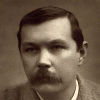“ Men that do not perversely use their words, or on purpose set themselves to cavil, seldom mistake, in any language which they are acquainted with, the use and signification of the name of simple ideas. ”
John Locke, An Essay Concerning Human Understanding (1689). copy citation
| Author | John Locke |
|---|---|
| Source | An Essay Concerning Human Understanding |
| Topic | language words |
| Date | 1689 |
| Language | English |
| Reference | |
| Note | |
| Weblink | http://www.gutenberg.org/cache/epub/10616/pg10616-images.html |
Context
“And, Secondly, Because they are never referred to any other essence, but barely that perception they immediately signify: which reference is that which renders the signification of the names of substances naturally so perplexed, and gives occasion to so many disputes. Men that do not perversely use their words, or on purpose set themselves to cavil, seldom mistake, in any language which they are acquainted with, the use and signification of the name of simple ideas. WHITE and SWEET, YELLOW and BITTER, carry a very obvious meaning with them, which every one precisely comprehends, or easily perceives he is ignorant of, and seeks to be informed. But what precise collection of simple ideas MODESTY or FRUGALITY stand for, in another's use, is not so certainly known.”
source



